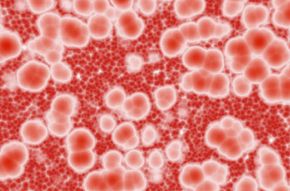Creatinine is a chemical molecule that is present in the serum (liquid portion) of the blood. It's produced from another molecule, creatine, which is a component of muscle. The amount of creatinine the body produces each day depends on the person's muscle mass -- a young, muscular man, for example, produces more creatinine than a petite elderly woman does. Because muscle mass normally changes very little, creatinine is usually produced at approximately the same rate every day in each person. It ends up as a waste product in the blood that is transported to the kidneys, where it's filtered out of the blood and removed from the body in the urine.
When the kidneys are functioning normally, the amount of creatinine in the serum should remain even. When they're not working properly, the serum creatinine level increases. This level is often used to determine how well the body's kidneys are functioning. We measure it with a serum creatinine test, a useful and inexpensive method of evaluating how well the kidneys are working.
Advertisement
Creatinine blood levels may be used to calculate another useful number called the creatinine clearance, a measure of the rate at which the kidneys filter creatinine out of the blood. Creatinine clearance, which is calculated using serum creatinine concentration and a patient's gender, age and weight, is a better estimation of kidney function than is the serum creatinine level.
Creatinine clearance reflects the rate at which the kidneys filter blood, which doctors call the glomerular filtration rate (GFR). This is another measure of kidney function. If the kidneys don't filter blood effectively, the glomerular filtration rate decreases and serum creatinine levels rise. As a result, serum creatinine level is an indirect measure of glomerular filtration rate.
Unfortunately, there isn't a good correlation between serum creatinine and kidney damage early in kidney disease. By working harder, the kidney can compensate for damage in the early stages of kidney disease. At the point that the level of serum creatinine goes up, the glomerular filtration rate may be reduced by as much as half. For this reason, the serum creatinine test isn't useful in diagnosing early-stage kidney disease, but it is used to detect more substantial kidney disease.
The serum creatinine test is more sensitive of kidney function than the blood urea nitrogen test (often referred to as the BUN test), which measures the amount of nitrogen in the blood that comes from urea. (Urea is produced by the liver as a waste product of the digestion of protein and is also removed from the blood by the kidneys.)
Advertisement
